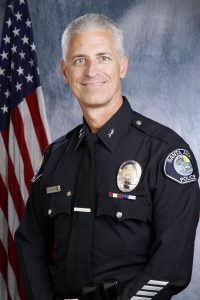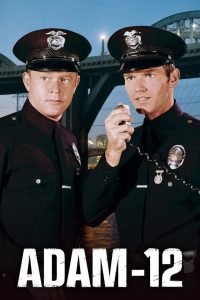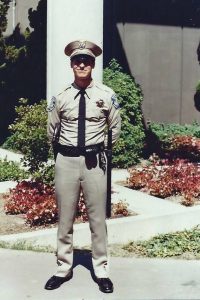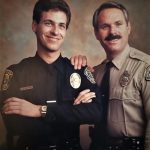Podcast Topics
Subscribe to the Law Enforcement Guru Podcast on your favorite player, and stay tuned for these upcoming topics.
Upcoming Podcast Episodes:
1. Law Enforcement Code of Ethics
2. How to Select the Right Agency
3. Completing Your Application
4. Surviving the Background
5. Medical Examinations
6. The Physical Agility Test
7. Interview Panel Questions
8. How to Handle Ethics Questions
9. Drug Use Hiring Thresholds
10. Negative Credit History
11. Negative Driving History
12. Your Military Experience
13. Written Test Preparation
14. Test Preparation Book Reviews
15. Test Preparation Services Reviews
16. Interviews with Agency Recruiters
17. The Polygraph Examination
18. The Chief's Interview
About The Law Enforcement Guru
 Why Trust Me? Every police officer has a story of how they became a cop, and I am no different. There is no singular path to a law enforcement career, but I can only assume you are at a crossroad whatever your current life phase. It doesn't matter where you have been, but rather where you are headed. I want to help you obtain your goal of a law enforcement career. It begins with whether or not to trust me to be your advisor and mentor and to answer the inevitable question, "Who is this guy doing this podcast anyway?"
Why Trust Me? Every police officer has a story of how they became a cop, and I am no different. There is no singular path to a law enforcement career, but I can only assume you are at a crossroad whatever your current life phase. It doesn't matter where you have been, but rather where you are headed. I want to help you obtain your goal of a law enforcement career. It begins with whether or not to trust me to be your advisor and mentor and to answer the inevitable question, "Who is this guy doing this podcast anyway?"
I retired from the Santa Ana Police Department in Southern California after 30 years of service. I rose through the ranks from officer, corporal, sergeant, commander, and ultimately deputy chief. The most important thing about my journey is I started precisely where most of you are at this very moment – as a civilian applying for a job as a peace officer.
The number one question asked during any entry-level law enforcement interview will be, "Why do you want to be a peace officer?" We each have our own answer to this question, and you will need to formulate your's based on your motivations. My response was clear. When I was ten years old, my brother Jim became a Los Angeles police officer and later transferred to my hometown police department. He would frequently stop by the house and have dinner or to use the phone. I was at a very impressionable age, and I couldn't have been prouder to have him as my brother.
 Early Role Models During the late 1960s and 1970s, there was plenty of support for law enforcement, which spurned numerous popular television show about public service. There was Dragnet with Jack Webb as LAPD Detective Joe Friday and the exploits of LAPD officers Reed and Malloy of Adam 12. We used to call these "training films" since they were the most realistic law enforcement shows at the time, but they look pretty unsophisticated now. They fueled the imaginations of many young men and women, inspiring them to apply to police departments. So, with a case of brotherly hero-worship and exciting police dramas on television, becoming a police officer seemed to be my destiny.
Early Role Models During the late 1960s and 1970s, there was plenty of support for law enforcement, which spurned numerous popular television show about public service. There was Dragnet with Jack Webb as LAPD Detective Joe Friday and the exploits of LAPD officers Reed and Malloy of Adam 12. We used to call these "training films" since they were the most realistic law enforcement shows at the time, but they look pretty unsophisticated now. They fueled the imaginations of many young men and women, inspiring them to apply to police departments. So, with a case of brotherly hero-worship and exciting police dramas on television, becoming a police officer seemed to be my destiny.
Family Influences Like many of you, I had the influence of my family on my career. Several cousins were lawyers, but no one in my immediate family had ever attended a four-year college. In looking at the possible future earning potential, I gravitated to the idea of becoming a lawyer. I was on my high school's Speech and Debate Team, Honor Roll every year, and accumulated enough credits to graduate at the end of my junior year. I graduated early my senior year at age 17 and attended community college while applying to the University of California at Irvine (UCI). So, although I was heading towards attending law school, I desired to be a police officer in the back of my mind.
At the end of my sophomore year at UCI, I enrolled in a Law & Society class and met a classmate who would eventually become my best friend. He told me he was applying for a part-time job at the UCI Police Department to be a Community Service Officer. I tagged along, and we were both hired, which began a rewarding part-time job while I continued with my schooling. I did campus escorts of coeds during night time hours and low-level, unarmed security. The best part was the daily interaction with the police officers, and many are now my life-long friends.
 The Police Academy My major required completion of a Field Study program, whereby I had to work at a public agency for a semester and earn credit. At the beginning of my junior year, I convinced a professor to give me credit for attending the police academy at the Criminal Justice Training Center at Golden West College in Huntington Beach, California. I approached the chief of the UCI Police Department and asked him to sponsor me to the academy. He agreed and issued me department shoulder patches and a badge but required I pay for tuition, service weapon, ammunition, and class supplies. I was only 20 at the time and had to have my older brother buy me a handgun.
The Police Academy My major required completion of a Field Study program, whereby I had to work at a public agency for a semester and earn credit. At the beginning of my junior year, I convinced a professor to give me credit for attending the police academy at the Criminal Justice Training Center at Golden West College in Huntington Beach, California. I approached the chief of the UCI Police Department and asked him to sponsor me to the academy. He agreed and issued me department shoulder patches and a badge but required I pay for tuition, service weapon, ammunition, and class supplies. I was only 20 at the time and had to have my older brother buy me a handgun.
The university police department arrangement was they hire me after I turned 21, and only if they had an available vacancy. This informal approval would likely never happen today. Still, I was off to the academy as only a student worker with a cursory background investigation, no polygraph, no psychological interview, no police officer oral board, or medical examination.
Application & Rejection I started the academy in April of 1981. About halfway through the academy, a local department had an opening. I applied and entered the background process, and here is the shocker – I was not selected because I was not "mature" enough. I failed the Background Investigation! I know a certain percentage of you reading this have also failed, so take heart - there may still be time for you.
How Could This Happen? I was 20 years old, only a junior in college, and still lived at home. During the late '70s and early '80s, police departments were hiring numerous Vietnam-era veterans, and there were plenty of candidates with more life experiences. I know being 20 years or older and living at home may be where you are right now due to economics. Still, everyone's primary goal was to get out of our parent's house quickly after turning 18, and not everyone was attending college or college graduates. Although it didn't make me patently "immature," I didn't fit the profile of the candidate they were looking for, and they had the absolute right to hire whomever they liked.
Rejected, But Not Dejected So, take heart if a law enforcement agency has already rejected you - there is still hope. After I told my academy instructors, they were shocked. At the time, I was ranked the #2 recruit overall in all subject areas. My instructors went to work making phone calls, and within a day, I had a preliminary offer of employment from another agency. In fact, during lunch, I was pulled into the Academy Director's office and put on speakerphone. On the other end was the chief of police of an agency in Los Angeles County, CA. He said, "The staff has told me about you, and if you just say the word, I will have you in our uniform by tomorrow afternoon." This may come as a bit of a surprise, but I didn't accept the job – I didn't want to work for that particular agency and wanted to stay in Orange County. I was really in no rush – no one could hire me until I turned 21 anyway, and I hadn't finished college yet. I graciously thanked him for the offer but respectfully declined.
Redemption A week before graduation, I was approached by Santa Ana Police Department Sergeant Larry Wagstaff (may he rest in peace), one of my Tactical Officers (AKA a drill instructor). He told me two weeks after graduation; his department would have one vacancy open only to Lateral Officers (current officers transferring from another police agency) and Academy Graduates (persons who graduated from an academy but not yet hired). The fact I was graduating meant I qualified as an Academy Graduate.
Surprisingly, there were over 300 applicants for one vacancy. The week after I graduated in late August 1981, I went to Santa Ana City Hall to fill out an application. Two weeks later, I had my oral interview, and to tell you the truth, I don't remember anything about the panel interview. I can only tell you I came out #1 and beat out those 299 other applicants. It was either because I crushed the interview, was the #2 recruit in the academy, or Sergeant Wagstaff highly recommended me.
Selection Process Success It took the background investigator about two months to do the preliminary portion of my background, and on my 21st birthday, I received a "Conditional Offer of Employment." That Conditional Offer meant the agency could legally send me to a psychological interview and medical exam. A little more than 30 days later, on December 28, 1981, at 2200 hours (10:00 pm), I started my first graveyard shift as a Santa Ana police officer.
Back to College You will recall I went to the academy as part of my college major. Well, I did get the credit and passed the class, and I never stopped taking college classes. I would get off work at 0630 (6:30 am) and go right back to UCI and take a morning class. Most of the time, I struggled to stay awake, and more than a few times, I had to depend on my tape recorder rather than taking notes. It would take me almost three years to finish up my Junior and Senior years. I loved the job and everything about it, but still looming in the back of my mind was my original intent to attend law school. I mostly kept this a secret from everyone at work. At the time, I made about $3,000 a month, which was the prevailing wage for most agencies. The earning potential for lawyers was much more, and I felt compelled to chase the money.
Off to Law School I passed the Law School Admission Test in early 1984, graduated UCI in June of the same year, and gained admission to California Western Law School in San Diego. I approached Santa Ana's chief of police and asked to revert to Reserve Officer status, which meant I would no longer be a full-time officer, convert to part-time with the requirement to work at least one shift per month. I moved down to San Diego and did a full year of law school.
A few times per month, I would go back and work a patrol shift, but the most valuable thing I learned in law schools was I neither liked the coursework or many of my fellow students. I witnessed innumerable unethical acts by classmates, including the use of many "performance-enhancing" drugs on campus and theft of library books so other students could not gain any competitive edge.
At the end of my first year, I took stock of what I wanted to do with my life and realized I was born to be a police officer. I called up the chief and told him I wanted to come back, and in September 1985, I was back on the midnight shift and couldn't have been happier. I knew it was the right decision for me.
 Back to the Police Department So, what did my family think? When I told my parents I was going back to the police department, I explained I would return to make a difference and be as successful as possible. My brother (pictured left) was supportive. It took several years to prove to co-workers I was there to stay. I was passed over for several positions because many believed I was back long enough to save money to go back to law school, but I proved otherwise.
Back to the Police Department So, what did my family think? When I told my parents I was going back to the police department, I explained I would return to make a difference and be as successful as possible. My brother (pictured left) was supportive. It took several years to prove to co-workers I was there to stay. I was passed over for several positions because many believed I was back long enough to save money to go back to law school, but I proved otherwise.
Law enforcement has been an incredible career and profession. I lived a life of purpose, one where I positively impacted my community and provided an above-average standard of living for my family. I am fortunate to have had a wide variety of experiences and took advantage of every training opportunity available.
In fact, I met my wife while on the job. One night I took a box of donuts into the emergency room where she was a nurse, and we have been married 32 years and have two children. So everything I have I owe to my career in law enforcement. I want you to enjoy the same level of success I obtained, so my current goal is to provide the information you need to succeed. We will take this journey together and prepare you to pass the law enforcement application and selection process. I can't wait for the first of you to get hired and be assigned an academy date.
Please let me know when that happens, and I will have you on the podcast to tell us about your journey.
Stay safe and healthy,
Tony Levatino
